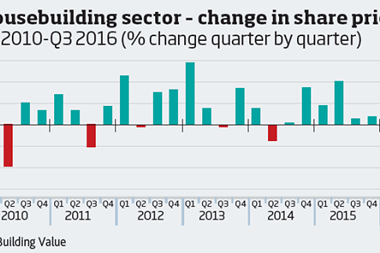After eight months of waiting, Mark Farmer’s government-commissioned report into the state of the construction industry is finally here.

In his report, Mark Farmer, chief executive of consultancy Cast, warns that the industry faces “terminal decline” unless it takes radical action and calls for: an overhaul of workforce training; government intervention to encourage modern construction methods; and a culture change to boost collaboration and innovation.
The review, called “Modernise or Die”, has been widely welcomed. Jamie Ratcliff, assistant director at the Greater London Authority, labelled it a “powerful report” and a “must-read”. Organisations ranging from the British Property Federation to the Construction Industry Training Board also lined up to praise Farmer’s work.
But in an interview with Property Week, Farmer reveals he had to “soften” some of his views to make them more palatable to government, after worrying the report would be “too hot to handle”. So has the review gone far enough?
Farmer may have pulled some punches but that does not mean the report is a comfortable read. The recommendation that has inevitably caught headlines is the introduction of a construction surcharge for housebuilders and developers, the industry equivalent of the “carrier-bag tax”.
The Farmer Review: 10 key action points
- Reform Construction Leadership Council around tripartite government, industry and client covenant in order to drive recommendations
- Reform CITB to be more efficient, fund innovation, and include related sectors
- Government, industry and clients to work together to reform industry business models around value for building end users
- Institute innovation programme with residential focus
- CITB to align grant funding to a reformed industry
- CITB or purpose made vehicle to specifically work on improving public image of construction
- Government to re-engineer further education sector, planning and tax/employment policies to produce right skills
- Government to use existing funding streams and policy to stimulate pre-manufacture
- Government to publish a pipeline of housing developments
- Government to impose client levy if above measures shown not to be working.
Farmer argues that large companies should pay up to 0.5% of the cost of a scheme’s construction into a government pot, which would then be used to help drive innovation and modernisation in the industry.
Developers are understandably wary. “I can see the attraction of something to deal with the frustration of slow progress - I get that - but I’m not sure how another levy will make much difference,” says David Cowans, chief executive of housing association Places for People. “We already have the apprenticeship levy.”
Cowans’ thoughts are echoed by the Home Builders Federation. “I think we need to look at what’s actually going on now before we think about levies in addition to the ones we’ve already got in place,” a spokesperson tells Property Week.
Martin Skinner, chief executive of developer Inspired Asset Management, adds: “[It’s] better to just deregulate and let the developers innovate.”
Breaking the impasse
Farmer is ready for “pushback” on the new charge. But he also insists that it might take something more “radical” to “break the impasse” the industry currently finds itself in.
“I recognise that clients may not necessarily be best pleased to be asked to bail out the construction industry and sort out its issues, and help fund it,” he says.
“But the industry itself is not in the position to initiate it. The trick will be to not set the barrier too high. You would gradually evolve a set of criteria that took the industry on a journey, and would allow clients to offset their liabilities by changing their behaviour.”
Farmer is keen to stress the charge is a “last-resort” option only to be implemented if the industry’s behaviour does not change by itself. However, he adds: “As a realist, I do have a nagging feeling that despite everything you try and do, the industry is very slow to modernise.”
The right balance
The new charge may prove controversial, but the report could have been more hard-hitting. “My initial thinking on certain things was a lot tougher, but when I reflected, [I thought] in reality it’s going to be politically difficult to move some of those things [forward].”
So does he regret toning the report down? “There’s always a risk that you’re not bold enough,” he says.
“I think the balance is right here though. Some of the things are going to be very uncomfortable reading. What I haven’t done is neutered my opinions to the extent that it becomes a superficial piece of work,” he says.
He does not modify his opinions relating to issues outside the scope of the report either. Some have only emerged over the past few months - such as the rise in xenophobia in Britain and falling value of the pound.

Both could drive skilled foreign workers out of the country, thereby deepening the skills crisis, warns Farmer, who says he has come across cases where the families of construction workers have even faced abuse.
“Whether it’s in schools or on the high street, a couple of things have been said where tradesmen become unsettled because of their family,” he says. “If people don’t feel comfortable here we’re going to lose a great asset, which is a skilled workforce. It would be a crying shame to be losing that to an outbreak of xenophobia.”
He adds the falling value of the pound has essentially amounted to a “big pay cut” for EU workers because they typically send their income back home to families in euros. Brexit means there’s a “real risk [of] losing what we’ve already got”, he says.
Fighting the tide
Communities secretary Sajid Javid pledged earlier this month to allow foreign workers to remain in the UK after Brexit - but Farmer warns that promise will be worthless if the UK cannot retain talented overseas workers. “If you’re already losing people that are here, you’re fighting
the tide,” he says.
As outlined in the report, there are a raft of other issues that also need to be addressed if the industry is to avoid sliding into terminal decline. While the review is complete, it is far from job done for Farmer. The task now is to implement the report’s recommendations, and fast, he says.
“If they’re talking about this review in 10, 15 years’ time, I’ll be very happy, providing it’s in the right context, and it’s led to change,” he says.
“It’s been seen by ministers and Downing Street, everyone is aware of the content and they’re looking for the reaction from industry.”
The message to the industry is clear: ignore these recommendations at your peril.





























No comments yet